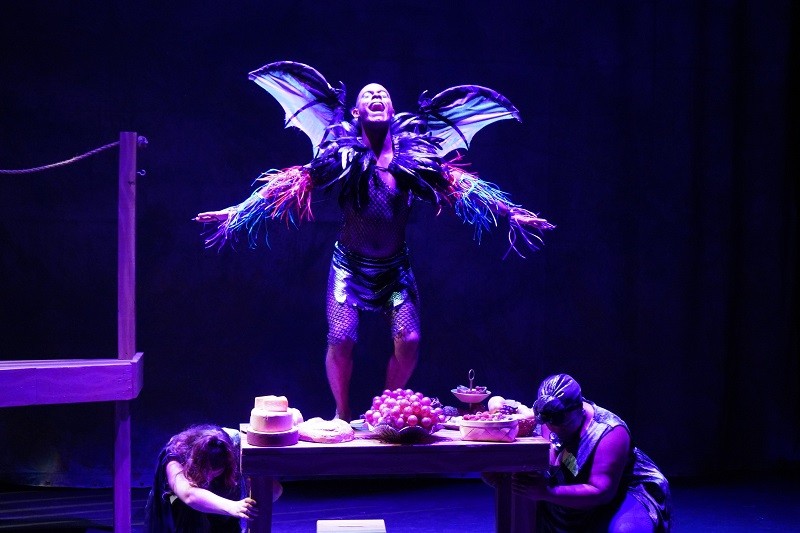The Tempest is about magic, and letting go of the past. The plot is straightforward for Shakespeare, who generally couldn't resist piling on mistaken identities, disguises and cross-dressing, but that doesn't mean the story is simple. Forgiving old grudges and forgoing revenge is difficult, especially when you have your enemy at your mercy.
And in the new gender-swapped version at St. Louis Shakespeare, that's right where Prospera has her sister Antonia. Exiled to a remote island after Antonia usurped her place as Duke of Milan, Prospera has had a dozen years to grind away at her grudge. She's also been able to hone her mastery of magic, and now she commands a storm that swamps the ship bearing Antonia and royal court members including Queen Alonza. Director Patrick Siler and his cast take this tale in some unexpected directions, winnowing out new details and delivering a fresh and truly magical production that succeeds even as it satisfies.
Every director of The Tempest faces the challenge of showing how the protagonist's magic manifests on stage. Siler uses music to evoke the spells being wrought, which opens up some interesting avenues. The eldritch storm that sets everything in motion is made real through pounding drums played by the ship's crew and musician David A.N. Jackson, a one-man orchestra. Bowed and buffeted cymbals become the wind and traditional hand drums pelt down rain, while the crew's drums are the surging sea, knocking passengers from stem to stern. Prospera's spirit Ariel (Karl Hawkins) sits with Jackson, conducting the storm with waving hands and a swaying body that mirrors the sea's churning. It's a beautiful scene.
After everyone goes overboard, they awaken separated on Prospera's island. Prospera's daughter Miranda finds noble Ferdinand and the two are simultaneously smitten. Antonia and Sebastian find themselves with Queen Alonza, while low-ranking dinguses Stephano and Trinculo discover a dead body.
As Miranda and Ferdinand, Erika Flowers-Roberts and Ian Carlson make a well-matched couple. Miranda has never seen a human man before, and so Flowers-Roberts reacts with hushed awe at the tall, handsome Ferdinand. His over-eager courtly speeches are somewhat fumbling, but his wide eyes and dreamlike movements imply he's besotted.
There's no such warmth between Antonia and Sebastian, but how can there be? Teresa Doggett makes a shrewish Antonia, furious at their predicament, while Charles Winning's Sebastian is thick-headed and dull-witted. They're perfect foils, and get to show off their rapport when Antonia tries to remain patient while explaining her very simple plot to kill the sleeping Queen Alonza (Laura S. Kyro).
The other comedy triad is Stephano (Jeff Lewis), Trinculo (Anthony Wininger) and Caliban (Dustin S. Massie), the son of a witch who's only playing dead when the trio first meets. Lewis and Wininger are entertaining drunks, while Caliban hatches his own murder plot with Prospera as the target. The trio are hilarious, one coward plus two sots being the Shakespearean equation for chaos.
But what of Prospera? Donna Northcott plays the wizard weaving all these strands together, and she's not as menacing or haunted as most men play the character. Instead her time on a tropical island seems to have mellowed her, an impression strengthened by ever-present sandals. (No one is a hard-ass in Birkenstocks.) With a smile always tugging at the corners of her mouth, she indulges Ariel's tantrums and demands to be released from her service with kind words and the promise to do as he wishes. Hawkins plays Ariel with a boyish charm, and Prospera responds with motherly kindness.
Only when Caliban bellows does Prospera display any anger. The island's original master, Caliban is petulant and impulsive, yet strangely non-threatening. Massie's performance shades toward boyishness as well, his outbursts and hyperventilating dance of joy evoking the hyperactive problem child whom many mothers guide into responsible adulthood.
Prospera seems to have succeeded with that too. After everyone is forgiven, engaged and sailing away toward home at last, Prospera releases both Ariel and Caliban. Ariel's exit feels muted (it was always expected), but Caliban responds with sheer joy and no signs of resuming his former dictatorial ways. Only Antonia seems unchanged by her island interlude, still bitter, still sneering at her sister. Prospera's work may not be done, but what woman's ever is?


